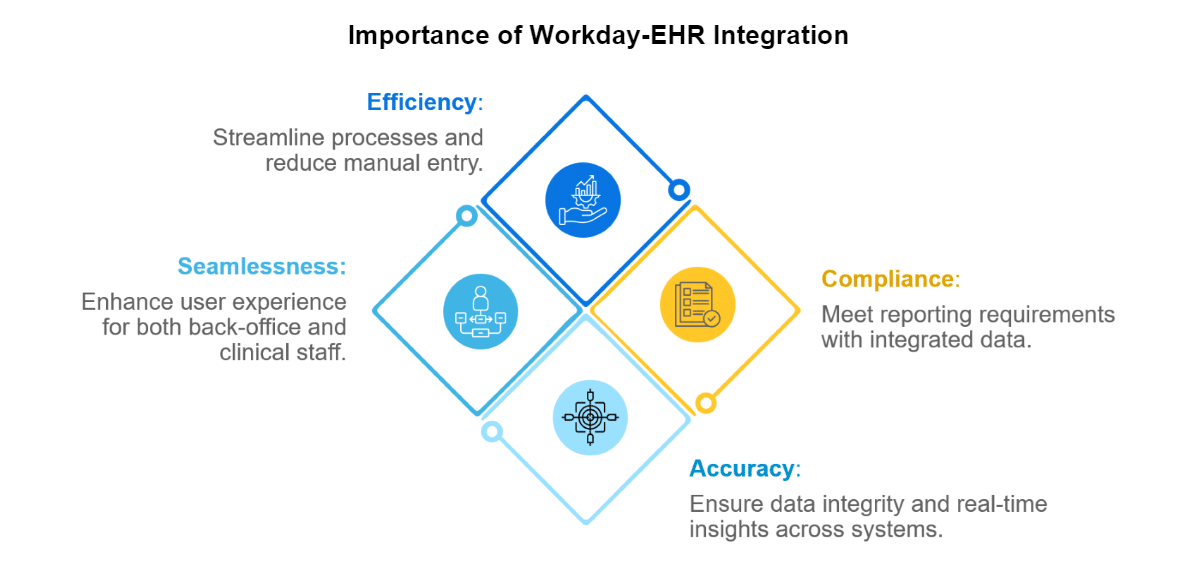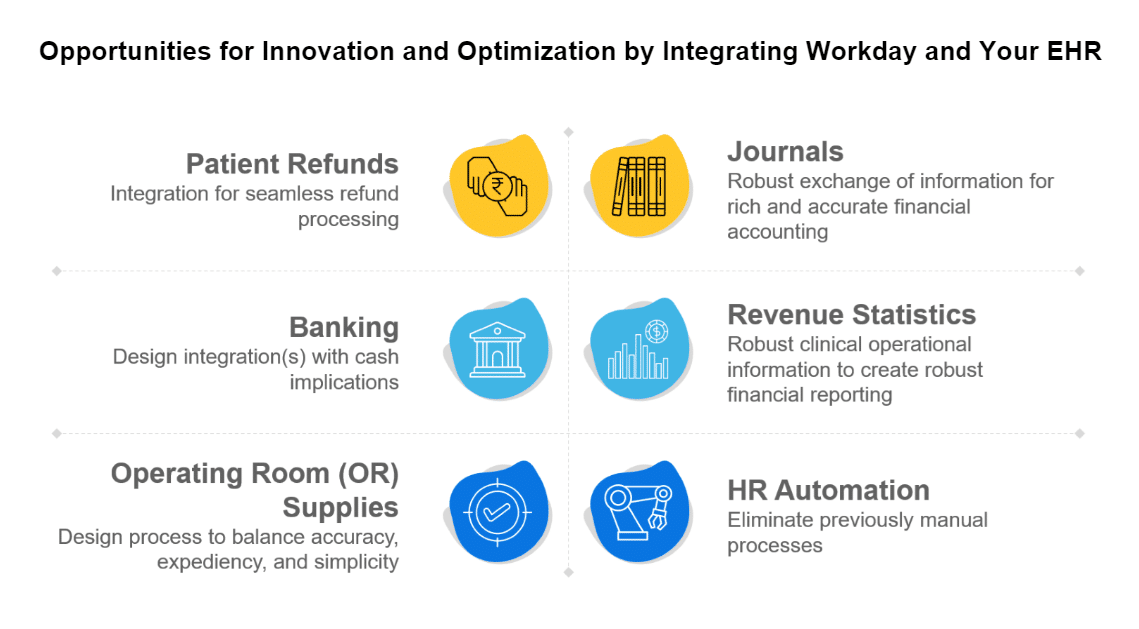Impact Advisors’ own Sahil Thiruvengadam and Dan Sell recently presented at Workday Rising about the importance of integrating Workday with your organization’s enterprise electronic health record (EHR). They stressed that while leveraging Workday’s EMR HeadStart is essential, hospitals and health systems should not lose sight of the numerous opportunities for innovation beyond pre-built integrations. Embracing process optimization, closely monitoring the Workday product roadmap, establishing a clear “source of truth” for data impacted in ERP-EHR integrations, and engaging with clinical and back-office stakeholders are keys to success that apply to any organization.
Benefits of Better Workday-EHR Integration
Improving the integration between Workday and your EHR drives streamlined clinical and back-office processes. Your organization can more effectively meet reporting requirements with integrated data, significantly improving compliance. Additionally, when you embrace the automation possible from better Workday to EHR integration, your hospital or health system will have increased data accuracy and integrity due to fewer manual touchpoints. Lastly, you can achieve a seamless user experience for clinical and back-office staff, allowing them to spend less time dealing with operating room supply shortages or chasing unpaid patient refunds – and more time delivering exceptional patient care for your community.

Identifying Opportunities for Improved Workday-EHR Integration
Effectively integrating Workday with your core EHR is a journey. It starts with identifying essential integration points between the two systems to ensure intentional design. It’s followed by testing, creating the reporting framework, implementing backup systems, validation, and monitoring.
Workday EMR Integration HeadStart is a solution of pre-built integrations between Workday and enterprise EHRs “designed to support a best practice approach to EMR / EHR integrations that will streamline implementations for [Workday] Healthcare Customers.” Any hospital or health system live on Workday should already be taking advantage of these pre-built integrations, as they are foundational components connecting your hospital or health system’s financial and supply chain modules to your enterprise clinical systems.
However, in addition to Workday HeadStart, there are additional integration areas between Workday and the EHR that can drive innovation, optimization, and added business value. Every healthcare delivery organization is different, and the most significant areas of opportunity for your hospital or health system will depend on your unique strategic goals and priorities, existing pain points, and other factors.
One area where Impact Advisors has seen tangible benefits from better Workday-EHR integration is revenue statistics (i.e., loading specific statistics and metrics from the EHR into Workday finance so organizations can assess charge capture, etc.). Another is syncing Workday HR information, events, and changes into the EHR – most notably, streamlining the process by which new hires, terminations, and data changes result in updated clinical access.
From a supply chain perspective, better ERP-EHR integration can sync Workday Item Master Changes into the EHR to inform patient markup calculation and load Inventory Depletions based on supplies used in EHR surgical cases. You can also automate the loading of bill-only requisitions into Workday from your EHR, making the procurement of implants much more efficient.

Keys to Successfully Capitalizing on Better Integration
There are universal keys to success that apply to any hospital or health system trying to capitalize on improved Workday-EHR integration:
- Embrace process optimization: A new Workday deployment is the ideal time to transform outdated manual processes into scalable, more automated workflows. Be sure to examine your existing ERP–EHR workflows across HR, Finance, and Supply Chain, carefully considering clinical and back-office processes that could benefit from more automation through better Workday-EHR integration.
- Ensure your organization closely monitors Workday’s product roadmap: Workday – just like every major enterprise vendor – will continue to release new and more sophisticated functionality over time. It is important to keep a close eye on the product roadmap and continuously review how new Workday modules and tools can be integrated with your EHR. For example, how can modules such as Workday Accounting Center and Workday Prism Analytics help you simplify cash reconciliation and sync trial balances into the Workday ERP? With such a process, you can pull trial balance data into Workday Accounting and drill into detail, resulting in rich financial insights for your ERP stakeholders. You can also create reconcilable transactions in Workday for your cash receivables and reconcile against bank statement lines in an efficient, scalable integration process.
- Establish a clear “source of truth” for Workday – EHR integration data: It is critical to decide which enterprise system will be the source of truth for what data. For example, will Workday pull HCPCS (Healthcare Common Procedure Coding System) codes from the EHR, or will the EHR pull them from Workday? What about the Charge Description Master (CDM)?
- Engage with clinical and back-office stakeholders to ensure optimal end-user adoption: Realizing the process optimization made possible by better ERP-EHR integration requires regular stakeholder engagement from the beginning of your integration journey. End users on the back office and clinical sides need to be actively involved in testing the processes impacted by improved integration between Workday and the EHR.
The Bottom Line
The benefits of better integration between Workday and your EHR are clear. Successfully capitalizing on those benefits hinges on embracing process optimization, maintaining an awareness of Workday’s product roadmap, establishing a clear “source of truth” for data, and engaging with clinical and back-office stakeholders from the start.
Impact Advisors’ experts can help with your ERP-EHR integration needs. With the industry’s top Operations, ERP, EHR, Analytics, IT Infrastructure and Security talent working together, we are leading the charge to securely connect business and clinical ecosystems.



